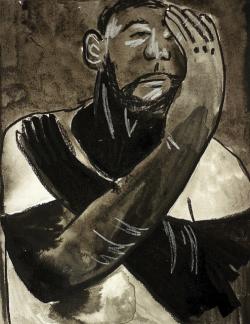
Art by Oaklee Thiele, part of the Breaking Point Project.
On July 26, 1990, the Americans with Disabilities Act (ADA) was signed into law after the tireless organizing of disability activists across the country. Disability Pride Month takes place each July to commemorate this historic milestone. It is a month to honor disability culture and history and to uplift the stories of people with disabilities. However, as this year’s celebration comes to a close, we must also take action to revitalize the movement’s roots in activism and reflect on how far we must still go to achieve meaningful equality.
For many disabled people, this 31st milestone was bittersweet at best. Our society has yet to embrace people with disabilities as equals at the most basic level, let alone develop respect for disabled experiences and perspectives. Black people with disabilities experience poverty at a rate of 36 percent, compared to 23 percent of white disabled people and 10.5 percent of all people in the U.S. Disabled people in this country still do not have marriage equality. Legally, employers may pay disabled people a subminimum wage through “sheltered workshops” — an average of $3.34 per hour.
These grim statistics seem endless, but the resiliency of people with disabilities cannot be bested. We are inventive, adaptable, determined, and proud. Disability Pride Month emphasizes that it’s equally important to highlight the beauties within the community as it is to educate the public on the barriers we confront every day. The ADA may have granted us protections under the law, but it cannot change the minds of those convinced we are less worthy — only through allyship and activism can we accomplish that.
At the Breaking Point
Last year, I co-founded the Breaking Point Project (BPP) which highlights both the humanity and hardships of incarcerated people with disabilities through narrative and art. BPP provides a platform for incarcerated and formerly incarcerated people with disabilities to tell their stories, then brings those stories to life through art to impress upon the general public the urgency of prison abolition and inhumanity of the criminal legal system. Talking about abolition and the criminal-legal system is impossible without talking about disability justice: approximately 38 percent of incarcerated people have at least one disability, as do half of all people killed by the police. The principles of disability justice fundamentally require the destruction of the carceral state. In the words of one BPP interviewee, “In order for something to be built, something has to be destroyed, and this jail’s administration has to be destroyed. We're too far along as a society to continue to be submerged in the wrongs and the corruptions, instead of to stand for what's right.”
Through BPP, incarcerated or formerly incarcerated people tell their stories in order to give a concrete backdrop to these statistics. They tell of abuse and neglect, hopes crushed and dreams dashed, all at the hands of a corrupt system purported to rehabilitate — not inflict further damage. They suggest changes for the future and visions of a world that remains, for now, a dream. Incarcerated disabled people are the experts on their own experiences; BPP merely seeks to provide a platform for their ideas and use the power of art to reach the general public. If people remain unaware of how carceral systems mistreat disabled individuals, there will be little impetus for social, political, or practical change.
We cannot confine disabled joy and pride to a single month, after which we are once again shelved by those who value us merely for the contributions our visible differences make to their public appearance. This month, we honored those whose lives were taken by our discriminatory society, celebrated those who are still here, and promoted dreams of a radically different future. The character of our society is defined by how it treats those who have reached their breaking point. How can we work together to pull disabled people away from the brink and into the warmth of community?
Lucy Trieshmann is a disability rights activist, third-year NYU Law student, and Ella Baker Intern at the Center for Constitutional Rights. See more of her work at lucytrieshmann.com and find the Breaking Point Project at thebreakingpointproject.com.

